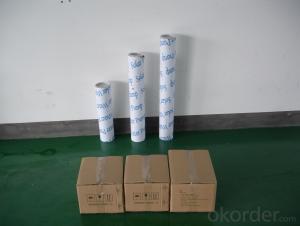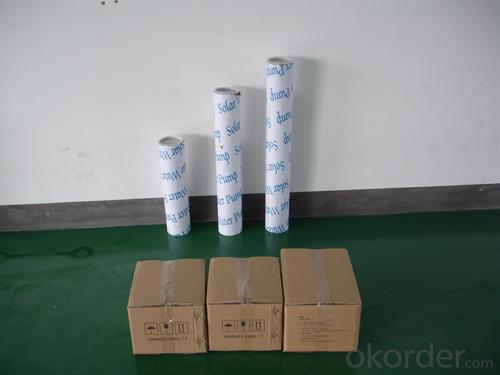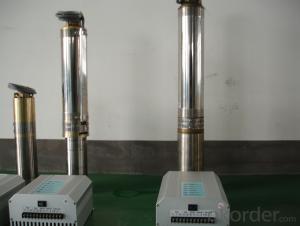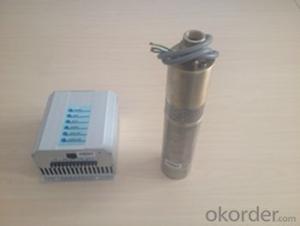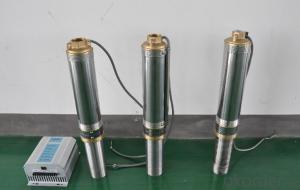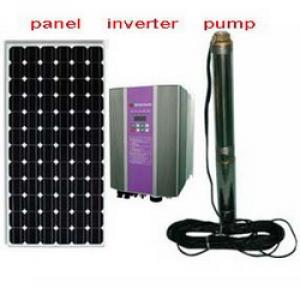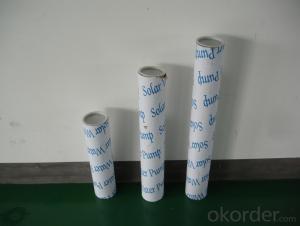24 Volt Solar DC Water Pumps
- Loading Port:
- China Main Port
- Payment Terms:
- TT OR LC
- Min Order Qty:
- -
- Supply Capability:
- -
OKorder Service Pledge
OKorder Financial Service
You Might Also Like
Item Description :
This superb new addition to our solar fountain range comes with a 10w solar panel,and a powerful fountain pump that is capable of producing fountains of up to 2m in height. As well as being easy to set up and use.Instruction manual is supplied for assembly and maintenance.
Solar Fountain Key Features :
Powered by direct sunlight
No high voltage electric mains required
Safe for children
Max. height of fountain: 2M
Max. flow capacity: 800 L/H(176 GAL)
10W Polycrystalline solar panel included
18V DC brushless pump
Solar Pump Features :
Can produce fountains up to : 2M (tube height) 1.4M (fountain height)
Comes with multiple nozzle accessories
Cable Length : 5M
Solar Panel Features :
10W peak power.
Polycrystalline highly efficient solar panel
Comes mounted in aluminium frame
Comes with ground stake and rotating knob so you can angle your panel toward the sun
What You Will Get :
10W solar panel
Solar pump
Ground Sake
Nozzle accessories
Precautions :
DO NOT alter or change the product itself or its components
Operate pump in freshwater only, never above 50 degrees celsius
Keep away from flammable liquids
Do not connect to any other power supply other than the included
- Q: Can a solar pump be used for irrigation in vineyards?
- Yes, a solar pump can be used for irrigation in vineyards. Solar pumps are a sustainable and cost-effective solution for delivering water to vineyards, as they use solar energy to power the pump instead of relying on traditional electricity sources. Solar pumps are particularly beneficial for vineyards located in remote areas or regions with limited access to grid electricity. They can provide a consistent and reliable water supply for irrigation, helping to maintain the health and productivity of the vineyard. Additionally, solar pumps have low maintenance requirements and can be easily installed, making them a practical choice for vineyard owners looking to reduce their environmental impact and operating costs.
- Q: Can a solar pump be used for water supply in disaster-stricken areas?
- Yes, a solar pump can be used for water supply in disaster-stricken areas. Solar pumps are a reliable and sustainable solution for providing access to water in areas where traditional power sources may be disrupted or unavailable. These pumps are powered by solar energy and do not require fuel or electricity, making them cost-effective and environmentally friendly. In disaster-stricken areas, access to clean water is often a critical need. Solar pumps can be used to extract water from wells, boreholes, or other water sources, and to distribute it to communities for drinking, irrigation, or other purposes. They can be easily installed and operated, requiring minimal maintenance and no ongoing fuel costs. Furthermore, solar pumps can be equipped with storage systems, allowing water to be collected and stored during daylight hours for use during the night or during overcast days. This ensures a continuous and reliable water supply, even in challenging conditions. Additionally, solar pumps can be integrated with water purification systems to provide clean and safe drinking water in disaster-stricken areas where water sources may be contaminated. This combination of solar pumping and water purification can greatly improve the overall water supply situation and help prevent the spread of waterborne diseases. Overall, solar pumps offer a practical and sustainable solution for water supply in disaster-stricken areas. They provide a reliable source of water without the need for conventional power sources, making them an ideal choice for ensuring access to clean water in emergency situations.
- Q: Can a solar pump be used in developing countries?
- Certainly, a solar pump can be used effectively in developing nations. Indeed, solar pumps have proven to be a financially viable and sustainable answer to obtaining clean water in remote and rural regions where traditional electrical systems are scarce or unreliable. Powered by sunlight, solar pumps require no fuel, rendering them dependable and affordable for communities in developing countries. These pumps are versatile and can be employed for various purposes, including irrigation, drinking water supply, livestock watering, and even small-scale industries. One of the primary benefits of solar pumps is their ease of installation and operation, necessitating minimal upkeep. They can be set up in areas devoid of grid electricity, eliminating the need for expensive and intricate wiring. Furthermore, solar pumps are environmentally friendly, emitting no greenhouse gases or contributing to air pollution. In numerous developing countries, gaining access to clean water is a significant hurdle, and the use of solar pumps can greatly improve the situation. By utilizing renewable energy, solar pumps offer a sustainable solution to communities' water requirements, reducing their reliance on traditional fuel-driven pumps or manual labor. Additionally, solar pumps can also foster economic progress in developing nations. By providing communities with a dependable and affordable water source, agricultural productivity can increase, enabling farmers to cultivate more crops and augment their income. Furthermore, solar pumps can generate job opportunities for local technicians skilled in system installation, maintenance, and repair. In conclusion, solar pumps are a superb solution for ensuring access to clean water in developing countries. They are cost-effective, sustainable, and simple to operate, making them suitable for remote areas lacking adequate electrical infrastructure. By harnessing solar energy, these pumps can contribute to overall development, economic growth, and improved living conditions in these nations.
- Q: How does the size of the pump motor affect the performance of a solar pump?
- Determining the performance of a solar pump heavily relies on the size of the pump motor. The flow rate, pressure, and overall efficiency of the pump are directly influenced by the motor size. When the pump motor is larger, it enables a higher flow rate, resulting in the ability to pump more water within a given time period. This is particularly important in scenarios where a substantial amount of water needs to be transported, such as in agricultural irrigation or large-scale water supply systems. A higher flow rate guarantees the effective and efficient delivery of the desired volume of water. Moreover, the size of the pump motor impacts the pump's ability to generate pressure. A larger motor is capable of creating higher pressure, which becomes necessary when pumping water to elevated areas or overcoming resistance in an extensive pipe network. The increased pressure ensures that water reaches its intended destination with sufficient force and can be evenly distributed across the irrigation system or other applications. Furthermore, a larger motor often leads to improved efficiency. With a more powerful motor, the pump requires less time to complete its pumping cycle, resulting in reduced energy consumption. This not only saves costs but also promotes a more sustainable utilization of solar energy. It is important to note that while a larger motor generally offers better performance, it also demands more energy to operate. Therefore, it is crucial to find a balance between motor size and energy availability. If the solar array providing power to the pump cannot generate enough electricity to operate a larger motor, it may be necessary to opt for a smaller motor that can still meet the required performance levels without exceeding the available energy supply. To conclude, the size of the pump motor significantly impacts the performance of a solar pump. A larger motor allows for higher flow rates, increased pressure, and improved efficiency. However, it is essential to consider the available energy supply when selecting the motor size to ensure optimal performance and energy utilization.
- Q: Can a solar pump be used in areas with limited access to water reservoirs?
- Yes, a solar pump can be used in areas with limited access to water reservoirs. Solar pumps are designed to operate using solar energy, which means they can be used in remote areas that do not have access to grid electricity or water infrastructure. These pumps can draw water from various sources such as wells, boreholes, rivers, or lakes, enabling access to water even in areas with limited water reservoirs.
- Q: How do I determine the water requirements for my application?
- In order to determine the water requirements for your application, there are several factors that need to be taken into consideration. Firstly, it is important to assess the specific needs of your application. It is necessary to determine the quantity of water required for each process or task involved. This may include tasks such as cleaning, cooling, or mixing. The next step is to evaluate the water quality that is needed for your application. Depending on the processes involved, some applications may require purified or distilled water, while others may be suitable for regular tap water. Understanding the required water quality will help in identifying the necessary treatment or filtration processes. The water pressure and flow rate required for your application should also be considered. Certain processes may require high-pressure water jets or a continuous flow of water. It is crucial to ensure that the water supply can meet these specific requirements. Furthermore, it is important to assess the availability and accessibility of water in your location. Factors such as the water source, its availability throughout the year, and any restrictions or regulations related to water usage in your area should be taken into account. Considering the environmental impact of your water usage is also essential. It is necessary to evaluate and implement sustainability and conservation measures to minimize wastage and reduce the overall water footprint of your application. Lastly, consulting with experts or professionals in the field is highly recommended. Their experience and knowledge can provide valuable guidance in determining the specific water requirements for your application and suggest any necessary equipment or technologies to meet those requirements. By taking into account these factors and seeking expert advice, you can effectively determine the water requirements for your application and ensure that you have a sufficient and sustainable water supply.
- Q: How long do solar pumps typically last?
- Solar pumps typically last between 15 to 25 years. The lifespan of a solar pump can vary depending on various factors such as the quality of the system, the brand, and the maintenance it receives. High-quality solar pumps that are properly maintained can even last beyond the 25-year mark. Regular maintenance, including cleaning the panels, checking the wiring, and ensuring proper water filtration, can help extend the lifespan of a solar pump. Additionally, investing in a reputable brand and choosing a system that is suitable for the specific application can also contribute to a longer lifespan.
- Q: Can a solar pump be used for domestic water supply?
- Yes, a solar pump can be used for domestic water supply. Solar pumps use energy from the sun to power the pump, allowing it to draw water from a source such as a well or a storage tank. These pumps are efficient, reliable, and environmentally friendly, making them a suitable option for providing water for domestic purposes.
- Q: What is the expected energy efficiency of a solar pump system?
- The energy efficiency of a solar pump system can vary depending on several factors. Typically, a well-designed and properly installed system can achieve an energy efficiency of around 60% to 70%. However, it is important to note that this percentage may change depending on the specific design, components, operating conditions, and maintenance practices of the system. Solar pump systems consist of photovoltaic (PV) panels, a motor, and a pump. The PV panels convert sunlight into electricity, which powers the motor that drives the pump. To determine the overall energy efficiency of the system, the efficiency of the PV panels is a crucial factor. High-quality panels with efficient conversion rates can significantly improve the energy efficiency of the system. Other factors that can impact the energy efficiency include the type and size of the pump, the distance and height that water needs to be pumped, and the overall design of the system. To optimize energy efficiency, it is important to select a pump that meets the specific requirements of the application. Additionally, proper sizing and design of the system can minimize energy losses and maximize efficiency. Regular maintenance and monitoring are also essential for maintaining the efficiency of a solar pump system. This includes cleaning the PV panels to remove dust and debris, checking for leaks or faults in the system, and ensuring the panels are properly aligned for optimal exposure to sunlight. In conclusion, achieving the highest possible energy efficiency in a solar pump system involves considering various factors such as PV panel efficiency, pump selection, system design, and maintenance practices. While the expected efficiency range is 60% to 70%, optimizing these factors can help improve the overall efficiency of the system.
- Q: Can a solar pump be used for water supply in public parks or gardens?
- Yes, a solar pump can definitely be used for water supply in public parks or gardens. Solar pumps are an eco-friendly and cost-effective solution for providing water in outdoor spaces. They harness solar energy to power the pump, eliminating the need for electricity or fuel. Solar pumps can efficiently draw water from wells, rivers, or other sources and distribute it for irrigation, fountains, or any other water feature in public parks or gardens.
Send your message to us
24 Volt Solar DC Water Pumps
- Loading Port:
- China Main Port
- Payment Terms:
- TT OR LC
- Min Order Qty:
- -
- Supply Capability:
- -
OKorder Service Pledge
OKorder Financial Service
Similar products
Hot products
Hot Searches
Related keywords
